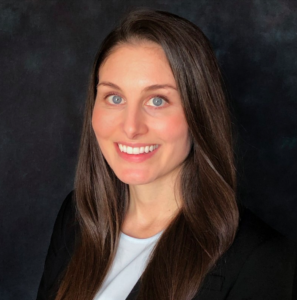Kathleen Watt works for Insurance Brokerage Firm in New York City. Katie was a Mathematic major, Class of 2011
What made you interested in studying mathematics at Northeastern? Why do you believe this is a great choice for a major?
“I am a little bit different in that I went into college searches knowing that I wanted to be an actuary. I really liked math and I knew it was something I wanted to study in college. When I had done preliminary research on what careers there were for mathematics majors, teaching always came up as a popular option, but that wasn’t something I was interested in pursuing. During the various college information sessions I attended, I realized I wasn’t 100% confident that I wanted to become an actuary. When I found Northeastern and learned about their co-op program, it seemed like a great option to explore what I wanted to do. The co-op program was the reason I chose math specifically at Northeastern. I think there are so many different opportunities and ways you can use your math degree which makes it a very flexible major.”
What opportunities can you pursue as a mathematics major?

“A lot of people I went to college with pursued teaching and did the five -year PlusOne
master’s program at Northeastern. Many also go on to graduate work: getting a master’s or PhD. There is a lot of coding or heavy data analysis which can lead towards the actuarial side. Some classmades went onto completely different careers such as law school or engineering programs because at the end of the day, math teaches you how to think and to problem-solve which is useful in so many skill sets.”
Are there any specific memories from your time at Northeastern that had a lasting impact on you? Any that influenced your career choices?
“Northeastern is where I made some of my best friends and where I grew into myself. It was also the first time I lived in a major city and used public transportation on an every day basis. From that perspective, Northeastern gave me the opportunities to experience all of these things and decide how I wanted to shape my lifestyle. All three co-ops helped me learn about the working world and what I would and wouldn’t want from a career path.”
While attending Northeastern, you completed three co-ops. How did each of your co-op experiences impact your career choices?
“As I said, I thought I wanted to be an actuary and live in a big city, so my first co-op was a dream come true from the perspective that I lived and worked in New York City. It was during during the financial crisis of 2008, so it was an eye-opening experience to be in an office and see those who work around you lose their jobs. It was a dose of reality on multiple levels to learn that it’s a business and you have to do what is best for you because companies will do what’s best for them. My second co-op was in the public sector because I worked for the government. It felt more like a community: everyone was friendly and worked more or less toward the common good. I realized for me and my personality style that the corporate ladder I wanted to climb wouldn’t be in that environment; however, it was a great experience for me to have and learn that I wanted to work in the private sector. I chose my first two co-ops leading up to my third to help maximize the opportunity for employment after graduation. Whether you have a good experience or not, you can always take something from it.”
How did you approach your co-op search? Is there anything you would do differently if you were a student today?
“I had a very methodical approach because my whole college career was targeted towards being an actuary. At the time, it was very hard to get an actuary co-op for your first placement. The employers required you either pass an exam or have prior experience, but I didn’t have either. So, the first co-op I completed was business related so I could acquire finance experience—actuaries are math heavy, but also financial related. My second co-op was with the department of defense and seemed interesting. All three of my co-ops had components that allowed me to learn more about the workforce and about career options in general. If I were to do anything differently today, I would spend several hours reading job descriptions because even if it’s not directly related to your major, you can still learn from the experience. Don’t think that because you don’t have enough skills that you shouldn’t apply, the worst they can say is no.”
Could you explain what you currently do for a living? What is a normal day at work like?
“I was an actuary after school for a few years, but then I moved to New York City and I now work as an associate for a life insurance brokerage firm. We work with ultra-high net worth individuals and family offices with their estate planning goals. Before I was an actuary, I worked at a life insurance firm and we sold a product which was life insurance policies. Now, I work for a brokerage firm which means that we look at all the life insurance companies and all the products they have to offer, we know the client’s goals and we help find the best product for them based on their needs. We aren’t tied to one company so we can find what works best for each individual client. A normal day for me is about 30% analysis. I use my knowledge of math and insurance to look at a client’s life insurance portfolio (or lack thereof) and try to find a policy that could be good for them. The next 30% of my role involves answering client phone calls, answering questions, and attending meetings. Finally, the last 40% of my responsibilities involves project management – making sure that when we are in meetings, all action items are accounted for, making sure we are meeting time lines, helping different department scollaborate and ensuring things are progressing smoothly. My job is super dynamic which is why I love it; it’s very different day in and day out. All my jobs and co-ops—even my lifeguard position in high school—helped me reach this point in my career because I learned different skills to apply later. For example, if I have a difficult client, I understand how to approach them because it is similar to having an angry parent at the pool whose child is in “time out”. You continue learning things from each experience, even if it does not seem directly related.”
What is your key piece of advice for anyone attending Northeastern?
“Take advantage of all of the co-ops because that is why you’re at Northeastern and make sure to learn something at every co-op. Build your network, find mentors, and be flexible. Northeastern is building a great list of alumni in many different cities and the more connections you make in school will make the world feel smaller.”

